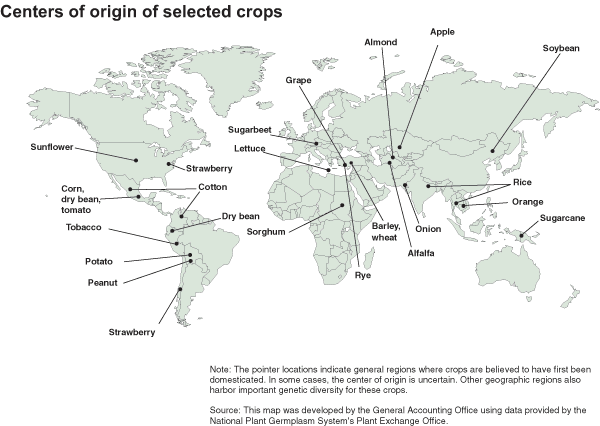|
Digital
History>eXplorations>Columbus & the
Columbian Exchange>The
Columbian Exchange>Origins of Plants
 |
This
map shows the sites of domestication for a number of crops.
Places where crops were initially domesticated are called centres
of origin
This
image is from the USDA. |
Sources
for more information:
| Origins of Selected Plants |
| FLOWERS: |
| dandelions |
"Listed by John Josselyn in New-England’s
Rarities, published in 1672, under the category: 'Of such plants
as have sprung up since the English planted and kept cattle in
New England.'
from Emergent vegetable of the Urban Ecosystem
http://www.gsd.harvard.edu/loeb_library/information_systems/projects/
E_vue/plants/taraxacum_officinale.htm |
| daisies |
|
| GRASSES: |
| barley |
"Barley has a very debatable origin. There
are two different thoughts as to where barley was originally
cultivated. J.R Hardin says that barley cultivation originated
in Egypt. There is evidence of barley grains found in pits and
pyramids of Egypt over 5000 years ago. There has also been ancient
glyphs or pictorials showing barley dating back to 3000 BC. There
have also been references to barley and beer making in ancient
Egyptian and Sumerian writings. The other thought is that barley
was originally cultivated in China around 1500-2000 BC. This
is evident by ancient pottery found depicting the end of the
famine by having barley fall out of the sky"
from Ethnobotanical Leaflets International Web Journal
http://www.siu.edu/~ebl/leaflets/barley.htm |
| white
clover |
"First cultivated in northern Europe. Ladino
clover, is a large form of white clover, originated near Lodi
in the Po River Valley in northern Italy."
from University of Massachusetts Extension Service
http://www.umass.edu/cdl/publications/wc.htm |
| Kentucky
bluegrass |
"Kentucky bluegrass is native to practically all
of Europe, northern Asia and the mountains of Algeria and Morocco.
Although the species is spread over all of the cool, humid parts
of the U.S., it is not native to North America. Apparently the
early colonists brought seed of Kentucky bluegrass to this country
in mixtures with other grasses."
from Richard L. Duble, Turfgrass Specialist, Texas A&M University
http://aggie-horticulture.tamu.edu/plantanswers/turf/publications/bluegrass.html |
| oats |
"Oats...date from about 1000 BC in Central
Europe. However, the Greeks and Romans of classical times were
unimpressed, regarding oats as coarse, barbarian fare; and the
Romans used them mainly as animal fodder, but did foster the
growing of oats in Britain, where they were to become important
as a food for human beings."
from The Oxford Companion to Food by Alan Davidson, Oxford University:Oxford,
1999, p. 547. |
| sugar and sugar cane |
"Sugar cane originated in New Guinea where it
has been known since about 6000 BC. From about 1000 BC its cultivation
gradually spread along human migration routes to Southeast Asia
and India and east into the Pacific. It is thought to have hybridised
with wild sugar canes of India and China, to produce the 'thin'
canes. It spread westwards to the Mediterranean between 600-1400
AD. Arabs were responsible for much of its spread as they took
it to Egypt around 640 AD, during their conquests. They carried
it with them as they advanced around the Mediterranean. Sugar
cane spread by this means to Syria, Cyprus, and Crete, eventually
reaching Spain around 715 AD."
from Plant Cultures: Exploring Plants and People
http://www.plantcultures.org/plants/sugar_cane_history_early_origins_and_spread.html |
| rice |
"Scientists have found the oldest known domesticated
rice. The handful of 15,000-year-old burnt grains was discovered
by archaeologists in Korea. Their age challenges the accepted
view that rice cultivation originated in China about 12,000 years
ago. The oldest known rice was discovered by Lee Yung-jo and
Woo Jong-yoon of Chungbuk National University in South Korea.
They found the ancient grains during excavations in the village
of
Sorori in the Chungbuk Province."
from BBC News, October 2003
http://news.bbc.co.uk/2/hi/science/nature/3207552.stm |
| wheat |
"Wheat is believed to have originated in southwestern
Asia. Some of the earliest remains of the crop have been found
in Syria, Jordan, and Turkey. Primitive relatives of present
day wheat have been discovered in some of the oldest excavations
of the world in eastern Iraq, which date back 9,000 years. Other
archeological findings show that bread wheat was grown in the
Nile Valley about 5,000 B.C. as well as in India, China, and
even England at about the same time. Wheat was first grown in
the United States in 1602 on an island off the Massachusetts
coast."
from Dr. Lance Gibson, Iowa State University
http://www.agron.iastate.edu/courses/agron212/Readings/Oat_wheat_history.htm |
|
